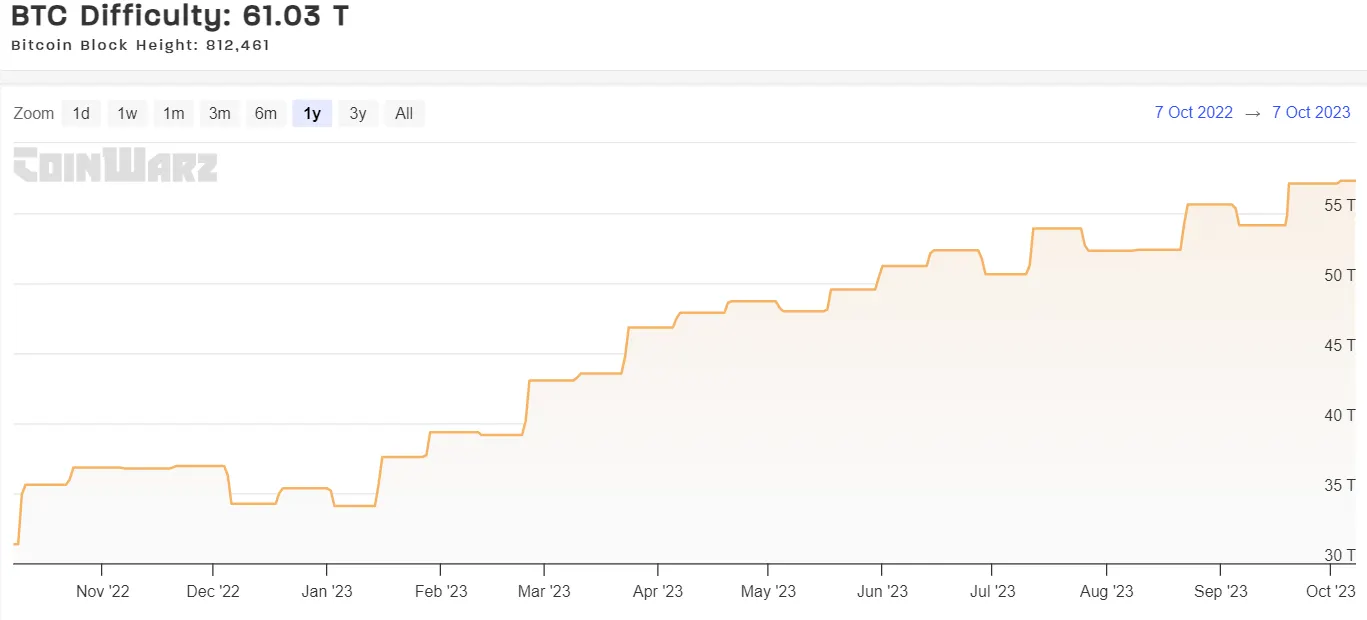Bitcoin’s mining difficulty level has hit a new high after another surge on Monday, rising by 6.47% and making it even more challenging for Bitcoin miners to uncover blocks.
According to data from CoinWarz, after the latest update, Bitcoin’s mining difficulty—the estimated number of hashes required to mine a block—is now at 61.03 trillion.
This is the third consecutive increase in Bitcoin mining difficulty, which has almost doubled since October last year.
Bitcoin's mining difficulty is readjusted every 2,016 blocks, or approximately every two weeks, as the network determines whether the activities of miners for the period resulted in the reduced or increased time to find a new block.

This adjustment period allows the network to evaluate whether miners have been able to find new blocks faster or slower than the target time of 10 minutes per block.
The mining difficulty is increased if blocks are being mined too fast and decreased if it takes longer than 10 minutes to mine a block.
An increase in mining difficulty means that miners need to allocate more computational power to successfully mine a block, and indicates a growing number of miners are joining the network, as mining becomes more computationally intensive.
Bitcoin halving and mining
Some experts believe the spike in activity can be attributed to the upcoming Bitcoin halving, which is now about 6.5 months away.
“This flurry of mining activity could be about maximizing returns before the Bitcoin halving next year,” Jeff Mei, COO of the crypto exchange BTSE, told Decrypt. “After that point, the rewards for mining Bitcoin will half, as the name suggests. So it’s possible we’re seeing miners squeeze all the value they can before that point.”
Mauricio Di Bartolomeo, co-founder and CSO at crypto lender Ledn, also believes that the next Bitcoin halving will be a “huge deal” for miners.
“There’s going to be a rush of miners coming online between now and May, every miner is going to try to squeeze every last drop of their equipment from the 6.25 per block payout rate, because from 6.25 BTC/block it’s going to drop to 3.125 BTC/block,” Di Bartolomeo told Decrypt. “So those that have machines pending to be connected, will be rushing to get them on the grid to collect to the higher payout rate while they still can.”
According to him, this will result in a run-up in difficulty up until the halving, however, once the halving occurs, “that huge rush to connect new miners will cease because those connecting from that point onwards will be making significantly less returns.”
Other reasons, according to Mei from BTSE, could also be a reflection of miners’ increased fears of an upcoming and dramatic rise in energy prices, which would have a major impact on their profitability.
“With regional tensions flaring up across multiple flashpoints, miners could be expecting oil prices and energy in general to become less affordable,” Mei told Decrypt.
Edited by Liam Kelly.

